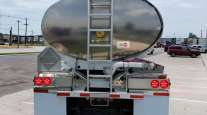Senior Reporter
FMCSA Proposes Revised Hours-of-Service Personal Conveyance Guidance

Federal trucking regulators have proposed revised regulatory guidance for truckers driving a commercial motor vehicle for personal use while off-duty.
The Federal Motor Carrier Safety Administration’s so-called “personal conveyance” guidance addresses revised hours-of-service requirements for CMV drivers who are permitted by their employer to use their vehicle for such personal uses as traveling to and from their place of employment, and for traveling short distances from a driver’s en route lodgings to, for example, a nearby restaurant.
The prior guidance, issued in 1997, explicitly excluded the use of laden vehicles for personal conveyance and the operation of a CMV as personal conveyance by drivers who have been placed out of service for HOS violations. In the proposed revision to the guidance, the out-of-service prohibition remains. For personal uses, the agency focuses on the reason the driver is operating a CMV while off-duty, without regard to whether the CMV is or is not laden.
Proposed Regulatory Guidance Concerning Use of CMV Personal Conveyance by Transport Topics on Scribd
“The previous guidance, which required the CMV to be unladen, was written for combination vehicles, where the driver could readily detach the trailer and use the unladen tractor for personal conveyance,” the proposal said.
Examples of appropriate uses of a CMV while off-duty for personal conveyance now include, but are not limited to, time spent traveling from a driver’s en route lodging (such as a motel or truck stop) to restaurants or entertainment facilities and back to the lodging.
The new guidance also would permit drivers to use personal conveyance for commuting from the last location where on-duty activity occurred to his or her permanent residence and then back to that last on-duty location. Examples of those locations include the driver’s terminal, trailer-drop lot or work site, according to FMCSA.
The new guidance would not permit movement of a CMV to enhance the operational readiness of a motor carrier, such as moving the CMV closer to its next loading or unloading point or other motor carrier-scheduled destination, regardless of other factors, according to FMCSA.
Other improper uses of personal conveyance include continuation of a CMV trip in interstate commerce, even after the vehicle is unloaded, bobtailing or operating with an empty trailer to retrieve another load, or repositioning a CMV and/or trailer at the direction of the motor carrier.
FMCSA is seeking comments on the guidance for 30 days after its posting in the Dec. 19 Federal Register.




